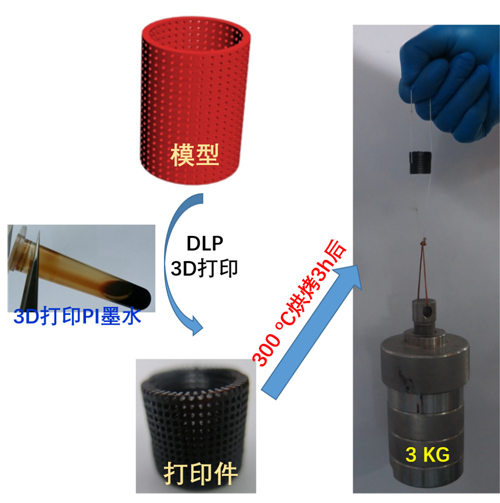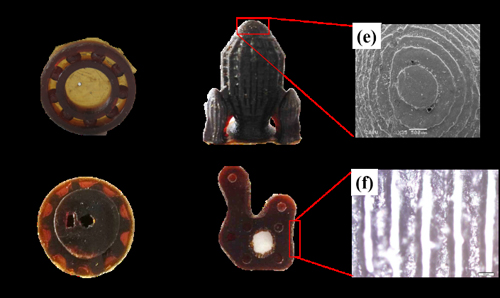The Surface Interface Research Team of the State Key Laboratory of Solid Lubrication, Lanzhou Institute of Chemical Physics, Chinese Academy of Sciences, has made breakthroughs in 3D printing of high performance ink materials. They have developed 3D printing high-performance polyimide photosensitive resin, and its excellent comprehensive performance enables direct 3D rapid prototyping manufacturing of high-precision, high-heat-resistance, high-strength and complex structural parts and mechanisms.
3D printing technology (also known as additive manufacturing) is a rapid manufacturing process with advanced molding technology. Among them, photo-curing 3D printing (such as SLA, DLP, etc.) is highly affected by the high precision of printing and the surface quality of printed objects, and is particularly complex in manufacturing shapes (such as hollow) and special fine parts (such as crafts, jewelry, etc.). Attention at home and abroad 3D printing industry. However, the resin materials currently used for photocuring 3D printing are mainly acrylate-based or epoxy-based materials, and molded parts printed using such resin materials have poor mechanical strength, poor high temperature resistance, hygroscopic expansion, and chemical stability. Most of the shortcomings such as poor sexuality can only be used in environments below 100oC. Therefore, its application is mainly limited to models, prototypes and design verification and art product production, and it is difficult to break through the bottleneck problem of direct manufacturing of parts. Therefore, the development of high-performance 3D printing ink materials to meet practical applications in the fields of high performance requirements such as automotive, aerospace and electronics has become an important challenge and research focus in the field of 3D printing at home and abroad.
As a special engineering material, polyimide has excellent mechanical properties, high temperature resistance, chemical corrosion resistance and excellent dielectric properties. It has been widely used in aerospace, aerospace, microelectronics, nano, liquid crystal, separation membranes. , laser and other fields. There is no doubt that the development of high performance 3D printed polyimide ink materials will have broad application potential in many fields. However, processing problems such as polyimide insoluble refractory have always been a bottleneck restricting its application and development. Therefore, the design and preparation of a fast photocurable polyimide resin with excellent solubility properties is the key to developing special requirements for solvent-free curing of photocurable 3D printing inks.
Through the molecular structure design of polyimide, the researchers developed a fast photocurable polyimide resin with excellent solubility and a comprehensive performance of photocurable 3D printed polyimide ink with excellent high temperature resistance (Solvent Free and Photocurable Polyimide). Inks for 3D Printing, J. Mater. Chem. A DOI: 10.1039/C7TA01952A). The glass transition temperature of the 3D printed polyimide material is greater than 200oC, and does not break and bend after 300oC oven treatment or hot oil immersion, and still maintains good mechanical strength (Fig. 1), indicating that it has excellent high temperature stability. Performance, long-term use at higher temperatures. The complex structural mechanical parts and models (Fig. 2) printed by using the resin material are expected to be developed and applied in the fields of aerospace, automobile manufacturing and microelectronics, and high precision and high in 3D printing advanced manufacturing technology in related fields. Direct rapid prototyping of heat-resistant, high-strength, complex structural parts and mechanisms offers new opportunities.
The work was supported by the “Light of the West†of the Chinese Academy of Sciences and the “Specially Appointed Talents Program†of the Lanzhou Institute of Chemicals, the Natural Science Foundation of Gansu Province (1606RJZA051) and Gansu Puruite Technology Co., Ltd.

Figure 1: DLP 3D printed polyimide oil filter plug and 300 ° C / 3 h high temperature baking experiment

Figure 2: DLP 3D printed polyimide high temperature parts (bearings, gears, gearbox covers, etc.) / model and surface profile of molded parts
(Editor)
Bar Stool Chair,High Quality Bar Stool Chair,Bar Stool Chair Details, CN
Queen Furniture Co., Ltd. , https://www.queenfurnitures.com